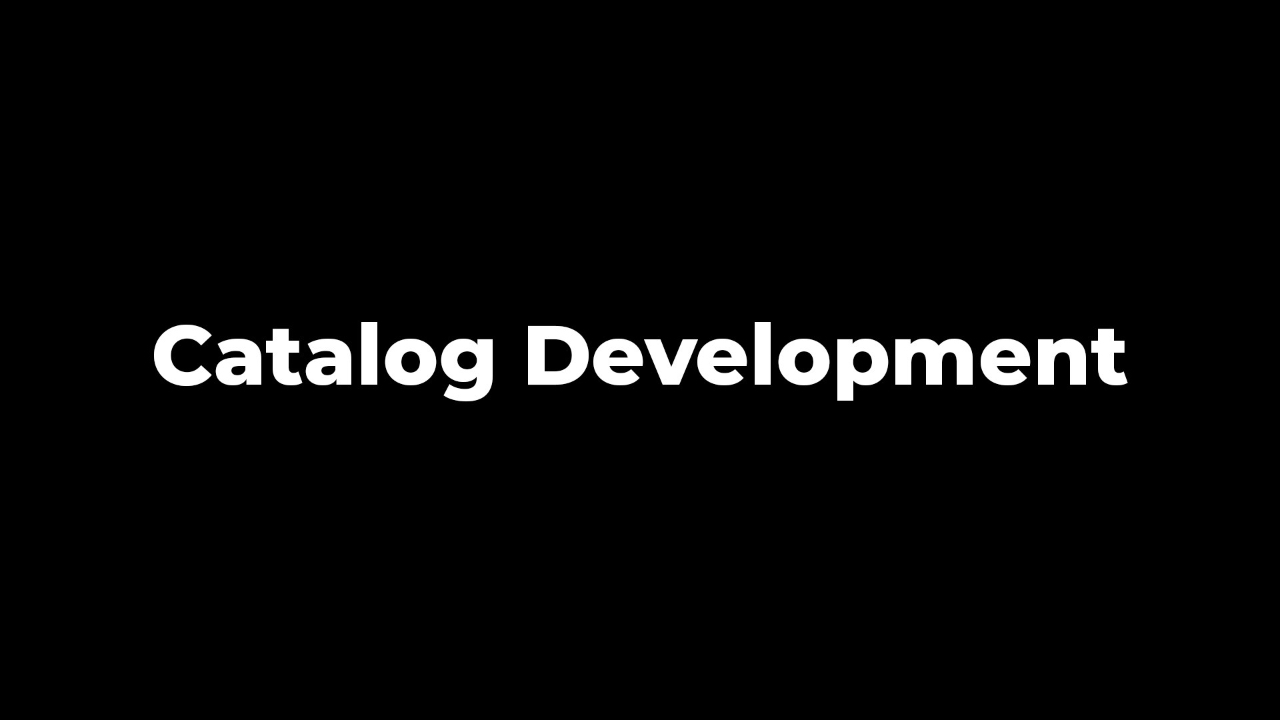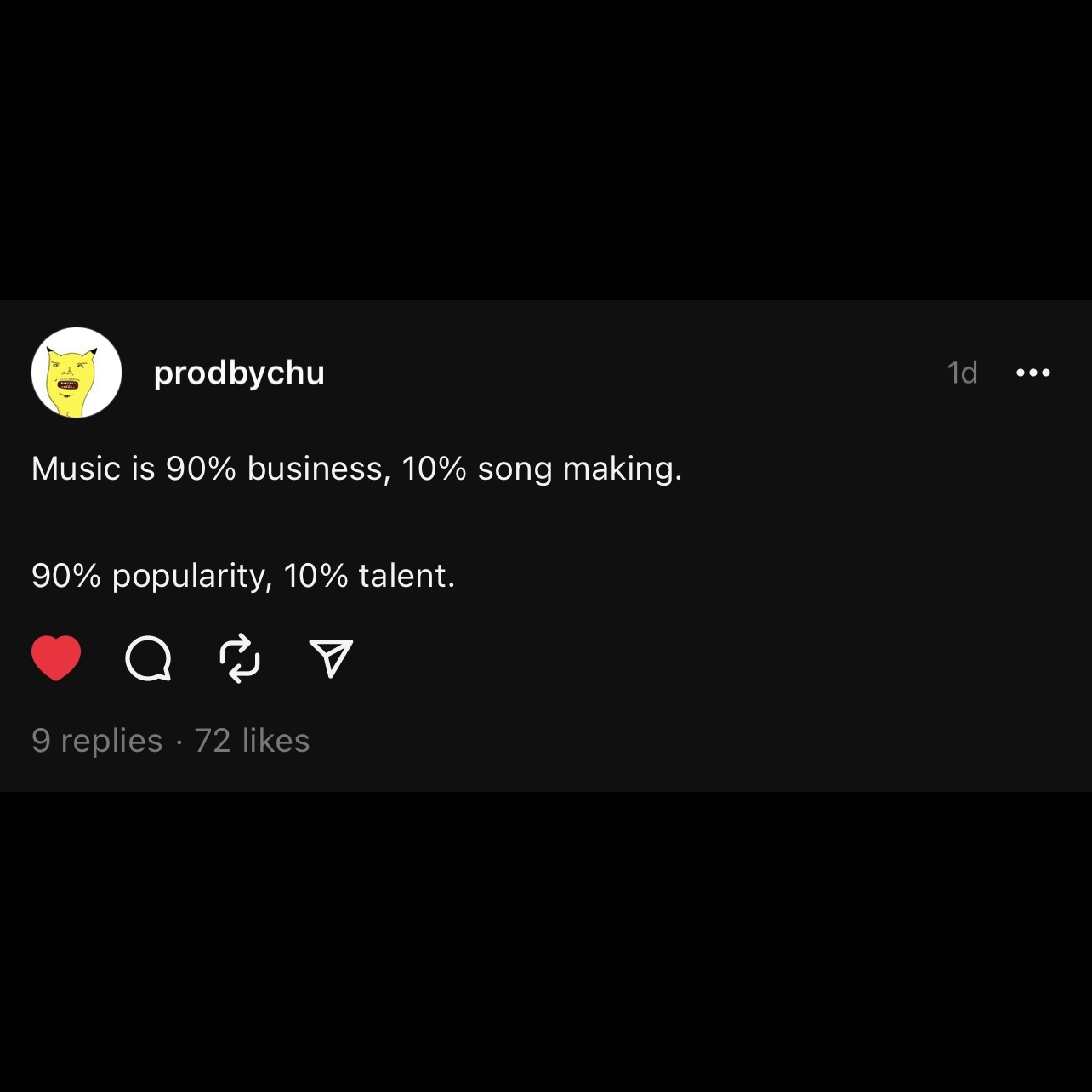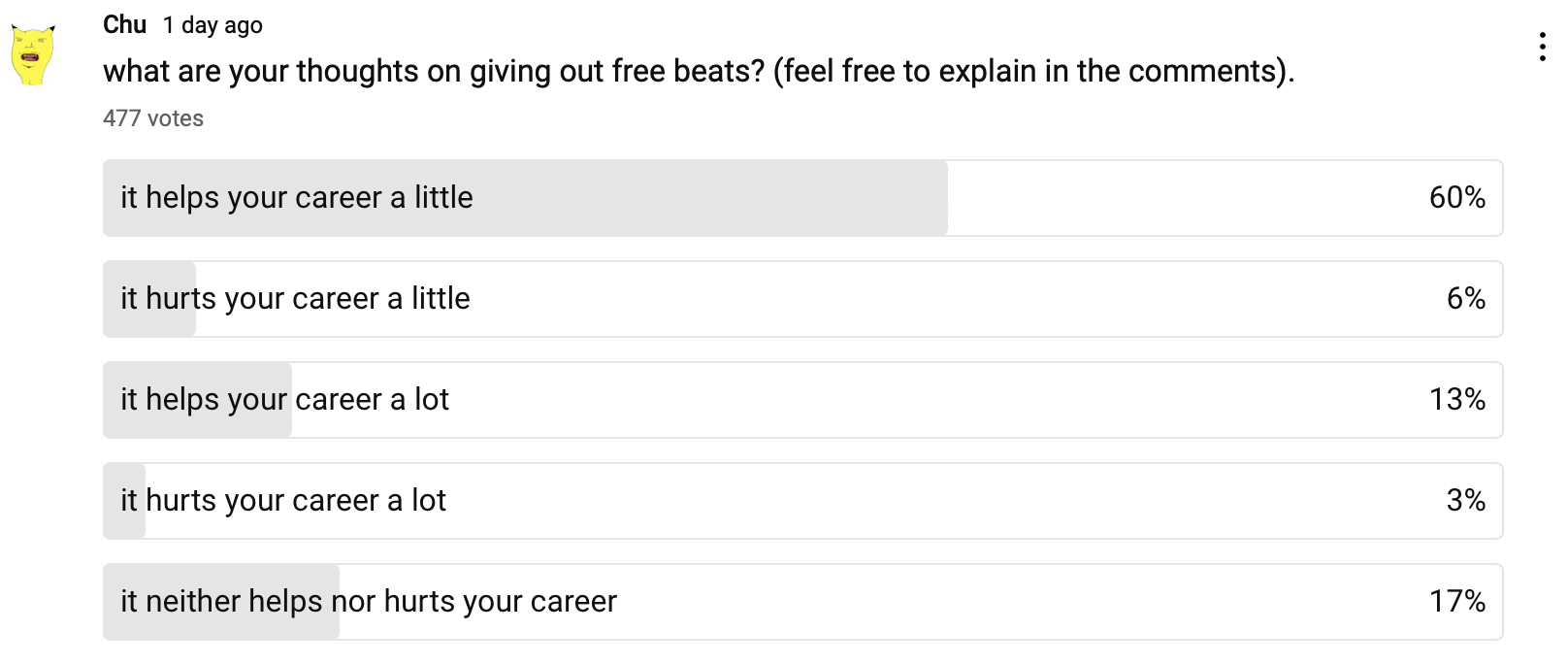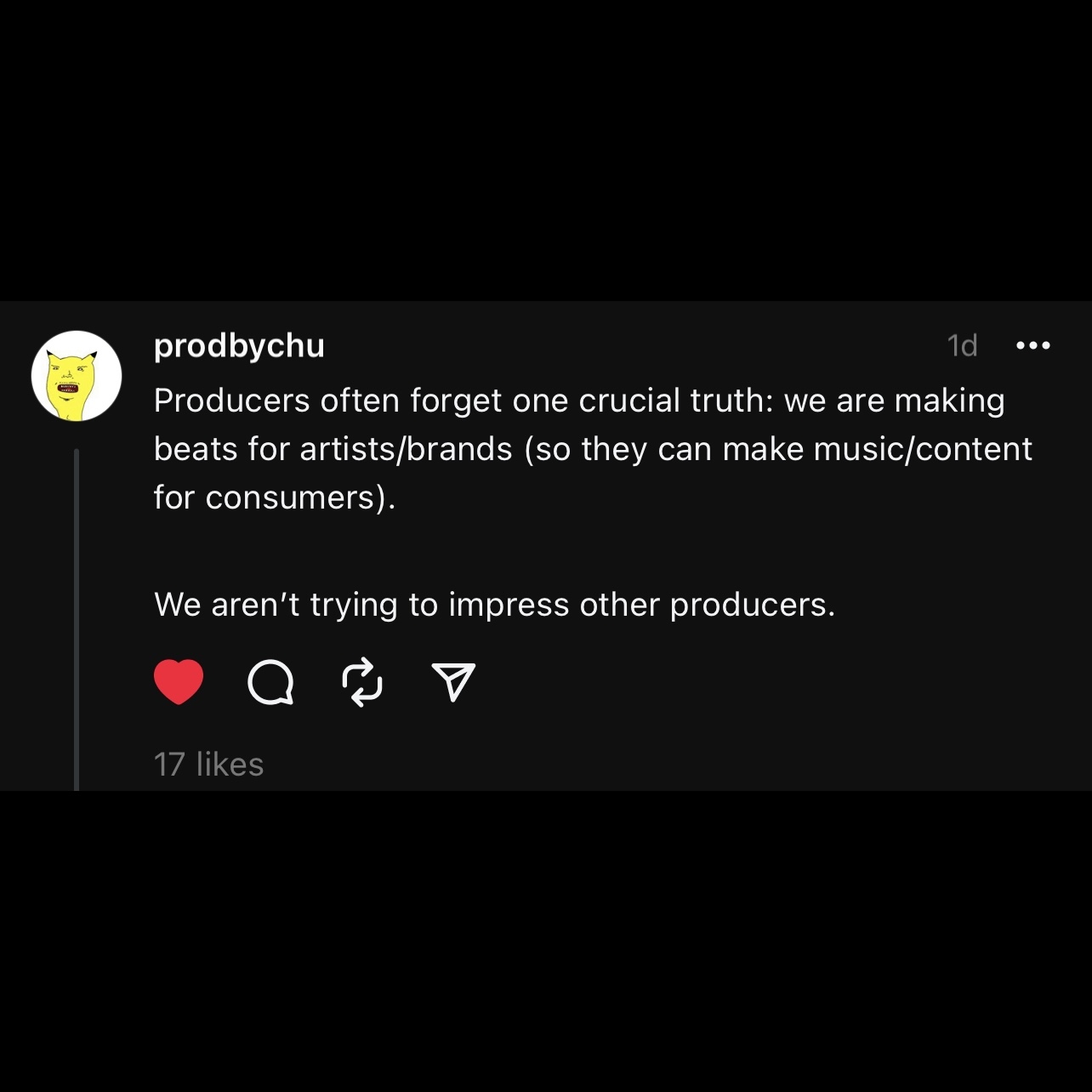
It’s 90% business.
“There are a lot of talented people who never make it because they don’t have the work ethic to make it.” - Rick Rubin, On The Joe Rogan Podcast.

Music is 90% business.
How does that sentence make you feel?
I’ve observed that people who see this statement usually fall into 1 of 3 camps.
-
“I know, and that’s great” (best camp).
-
“I know, but I hate that it’s like that” - the majority are here.
-
“I disagree; t’s not like that at all” (worst camp).
The worst camp to be in.
I think whoever disagrees is looking for a reason to blame their lack of success on.
It’s easier to say “music is all about the talent” than to admit that they aren’t great at building a brand that makes people care about their art.
It’s takes work and discipline, and they don’t want to do that. They’re lost until they can at least admit that music is fundamentally a business that requires effort (which moves them into the next camp - realizing it, but not liking it).
This is something Rick Rubin touched on when he was on the Joe Rogan Podcast:
“There are a lot of talented people who never make it because they don’t have the work ethic to make it. So it’s not just talent... like talent is a piece. And you could argue for some people, the work ethic trumps the talent.”
The camp most people are in.
I think people who agree that music is a business but don’t like that fact are the majority.
And I get it.
They are the people who do this because they love the art. They also want to build a career out of doing what they love.
That’s how I am (or, rather, used to be).
It was vital for me to reshape the way I defined ‘business.’
The act of business is an act of service. Businesses serve.
The best businesses are the best at serving. Businesses that fail are the ones that cannot render adequate service. So our goal as a business-minded music producer is to render the best service possible through our art and creativity.
We stay passionate without neglecting the business aspect.
This allows us to have a better attitude about the business aspect of music.
This moves us into the third camp, which is where we need to be in order to make progress and build up a catalog that earns money.
The best camp to be in.
Once you agree that music is 90% business, you only need to know how best to execute from the business side.
Talent is assumed (or, at least, skill is).
You can’t be bad (drum samples/presets, melody making, and mixing are good places to begin improvement).
However, talent and/or skill won’t get you far on their own unless you are lucky (luck is not a business plan, nor is it a good bet).


We talked about that in the Music Producer Skill-Tree newsletter when we addressed that Michael Jackson, one of the most talented musicians ever, developed a rigorous training system when he was just a child.
We know it’s about business. And we know that the goal of business is to reach and serve as many people as possible.
The way we do this is by understanding our role and playing it effectively.
Play your part.
“If we zoom out of our small view of reality, we function more as an instrumentalist in a much larger symphony the universe is orchestrating.” - Rick Rubin, The Creative Act.
We all have a part to play that serves the music.
The most important understanding you can have as a music producer is that it’s not about you - it’s about the music.
This has been a hard lesson to learn for me (and I still get pop quizzes every once in a while).
The other day I was in the studio and the artist was doing everything the way I hated.
It was frustrating for me to watch them do what I considered being ‘fucking up.’ But I remembered something that session guitarist Tim Pierce said in an interview on Phillip Conrad’s YouTube Channel.
He said one of the best things you can do in the studio is give people what they want. Be willing to allow your ego to get destroyed and then be able to bring it back full force.
Pierce discussed the importance of putting your feelings away and having emotional control.
The best piece of advice he gave was on what to do when you become resentful; Take a deep breath, come back, and never lose track of the work. Stay positive and do your best.
This was incredibly helpful for this situation, and I did just that. I took a breath and did what I could to serve the artist.
And by the end of the project, we ended up with an amazing product. Something way better than what it would have been if I’d gotten my way (or had thrown a tantrum about not getting it my way).
The core of working with artists and building your catalog is sacrificing your ego.
This happens before you even start doing sessions. Ego death is an ever-present aspect of successful music production.
And it starts with the willingness to do free work.
Using free beats to launch your catalog.
Giving out free beats is something that most producers will have to do.
The goal is to have a system where you give them a free beat in exchange for their contact information (email is best). I teach you how to do this in Level 1 Content Creation.
With this contact info, you will:
-
Send them information on artist development (as you learn, you teach - provide value so that value flows back to you).
-
Send them more free beats.
-
Offer them paid leases (later down the line).
-
Remain in close communication.
I polled my YouTube audience, and it showed that most people (~70%) understand the importance of this in a production career.

Yet most people never get this far.
Most of the time it’s because they have no confidence in their beats.
Your fear of criticism cannot be greater than your desire to make progress, which is something Rick Rubin nails in ‘The Creative Act’:
If a creator is so afraid of judgment that they’re unable to move forward, it might be that the desire to share the work isn’t as strong as the desire to protect themselves. Perhaps art isn’t their role. Their temperament might serve a different pursuit. This path is not for everyone. Adversity is part of the process.
Build your fundamental music production skills (get good at making beats).
Then get feedback on those beats - this is the only way to know if you’re making something people want.
Feedback comes in many forms.
Payment is a type of feedback (maybe the best, most affirming kind).
However, before you can get paid, you need to know if people even want to use your beats at all.
This is the core purpose of giving out free beats (but there are other benefits which we’ll discuss soon).
How to make beats that people will actually use.
“Often, the most innovative ideas come from those who master the rules to such a degree that they can see past them or from those who never learned them at all.” - Rick Rubin, The Creative Act.

Your production also needs to stay out of the way of the artist.
That’s how you’ll get them to use your instrumentals (first for free, then eventually for payment).
There’s a natural desire to show off in your production (trust me, I get it).
You want to show your creativity and originality and set yourself apart.
But, simple beats are usually a better play. Cluttered, over produced beats don’t leave any space for the artists.
It’s already difficult enough for them to come up with bars. You want as little to distract them as possible.
There’s a time and a place for complicated beats (beat battles, your own DSP releases, etc.).
However, for dealing with artists and commercial brands, your beat should be a template that inspires them (not a demonstration of your prowess).
This takes skill.
Learn everything and then strip it all down so that you have multiple ways to make something simple yet inspirational.
This is the key.
Put your beats to work for you.
It’s a good move to post your beats to DSPs (streaming platforms, such as Spotify and Apple Music).
This is the time and place for complicated beats. It’s your individual discography, and you can do as you please.
There are 4 reasons this is helpful to you:
-
Your beats get more visibility.
-
You can build a fan base that enjoys your style.
-
You’ll learn what aspects of your style resonate most with consumers.
-
You can earn money through publishing payouts from distributors (like Distrokid).
As I’ve grown a following for my beats (5,000 monthly listeners on Spotify as of writing this), I’ve learned that my simple beats get the most engagement.
Even in terms of instrumentals, well-executed simplicity seems to make for the most enjoyable listening experience (anecdotal, but this may be helpful for your own journey).
Once you have beats that artists and listeners enjoy, the goal is to de-commodify your beats so they become valuable enough to be worth money.
Build your catalog by de-commodifying your beats.
A commodity is a basic good used in commerce that is interchangeable with other goods of the same type (Investopedia’s definition).
I like this definition because of the phrase “interchangeable with other goods of the same type.”
Milk is a commodity. Most people don’t care what brand they get, only that the price is the lowest. Gasoline for cars is the same way.
This is how most producers sell their beats (which is why most of them fail).
You don’t want your beats to be “interchangeable” with those of another producer. Otherwise artists and brands will just opt for the cheapest, most widely available choice.
You de-commodify your beats in three ways
-
Getting good (drum samples/presets, melody making, and mixing).
-
Infusing style - after you’ve nailed the basics.
-
Develop branding (the best way is through content creation).
You have to be good.
Otherwise, you inherently have no value to offer. Artists and companies don’t want bad beats.
You infuse your style to insert creative spirit into your beats. Your beats have a ‘tag’ without you tagging them. But this can only be done after you get good.
Focus first on getting good.
You develop a brand so that you stand out (visibility).
On top of high quality, unique beats, you also have a personal brand. Now your beats are a 1-of-1 product.
Even if someone stole them from you, they couldn’t do the same thing with them, because they don’t have your personal brand. Your personal brand is like a business card that works while you sleep, eat, and s***.
The de-commodification of your beats is the culmination of this entire lesson. Understand what artists and brands want to buy.
It’s not the beat. They want:
-
Convenience (the cheapest option that fixes their need for a beat), or
-
Connection (working with a brand they like that also provides the beats they happen to need).
Understanding this is the key to executing the methodology I’ve developed to build my production catalog.
The 5 P’s (How I work with artists and brands).
The 5 P’s of building my music catalog are:
-
Preliminary Development.
-
Personal.
-
Purchase.
-
Partnerships.
-
Placements.
#1 - Preliminary Development.
Preliminary development is all about getting started.
You need to give out free beats (hopefully, by now, it’s clear why).
I still do this because goodwill is one of the best ways to begin a relationship with an artist (even those you will sell to or place later).
You can learn how to set up your own system in Level 1 Content Creation.
Collect e-mails in exchange for the free beats.
Remember: your beats need to be good.
Then you need to develop a system for giving out free beats.
#2 - Personal.
We also need to post our own beats on DSPs.
This helps us:
-
Build a solo fan base (and add to our stream count).
-
Make Money.
-
Get additional feedback.
Check out this newsletter for a guide on how to monetize your beats through content creation and solo DSP releases (start your own label).
#3 - Purchase
You can start selling beats when 1) people gladly take your beats for free, and 2) your beats get good engagement on DSPs (or some other type of music stream platform - like type beats SEO).
Build a backend system to sell beats. The emails you collect from giving out free beats will be your future customers.
That’s why it’s important to build good relationships by giving out free beats, delivering value, and staying in touch.
#4 - Partnerships (advanced).
I build up my brand by posting valuable content.
All the great independent producers do this. Kyle Beats and Kato are just a few good examples.
The main point is that money and success flow toward value. People naturally want to work with more visible brands.
You can build a visible brand by mastering content creation.
#5 - Placements.
My mentor said something that blew my mind the other day.
“Chu… the bar of expectations for producers is so low. They would rather have a big placement, which most small producers never see payment from because small producers don’t get royalty points. Instead of having a solo brand that works with dope independent artists and makes money. All because they think clout is better than a successful career. Because they think that’s all they can have and that’s all they are worth. It’s kind of sad.”
It is sad.
As producers, we have to re-define “placement.”
My new definition: a placement is any situation in which your beats sees success.
Getting a rapper to use your free beat is a placement.
Selling your first beat is a placement.
Getting 1,000 views on a YouTube video where you made a beat is a placement. That’s a thousand people who just heard your beat - it got placed in a content piece (that you created and own).
Everything is a placement. Raise your bar.
Posting a picture of album art because you had 1% input on one song (which you’ll never be paid for) should not be the pinnacle of music production.
Change your perspective.
Understand that there are better goals than placements.
Understand that a placement is anything you want it to be, as long as it drives you to succeed.
Make meaningful connections with actual artists.
Build your solo followership.
Grow your network and brand through content creation.
And generate a predictable income by delivering valuable service (instead of hoping and praying to God for placements).
Blessings ❤️🔥 - Darth Chu.
Would you like 1-on-1 assistance?







